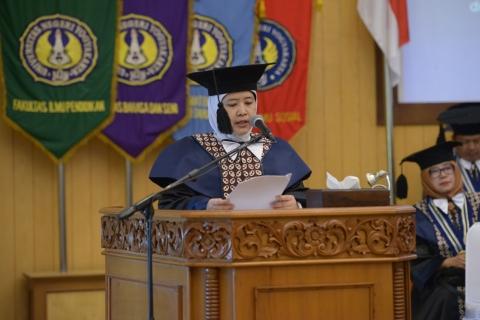Tata Boga - D4
Fakultas Vokasi Kampus Wates,
Yogyakarta, 55281

Strengthening food security and community health status is not only the responsibility of the government, but the responsibility of everyone as a society in Indonesia. The existence of the Industrial Revolution 4.0 must be a momentum to increase synergy between the government, universities, industrial agents and community to realize growth and increase competitiveness. Food innovations must be oriented and have global competitiveness without being rooted out, which is always grounded in the wisdom of Indonesia's local potential , as well as being consumers who are able to choose and sort out local food that is positively increasing for health as a choice, so that at least we can seat local potential-based products to host our own country. This was conveyed by Prof. Dr. Mutiara Nugraheni, S.T.P., M.Sc. in his inaugural speech as Professor in Food Technology in the Faculty of Engineering, Yogyakarta State University. Speech entitled "Local Flour Based Product Development for Strengthening Food Security and Indonesian Public Health Degrees" which was read out in front of an open Senate meeting in the Main Meeting Room of the Head Office of UNY, Saturday (15/2). Mutiara Nugraheni is the 150th professor of UNY.
The woman born in Bantul, January 31, 1977 said, in terms of potential availability, Indonesia has an advantage with enormous food resources, both vegetable and animal which can be utilized optimally to meet the food needs of Indonesian people. At present, Indonesia is ranked as the third largest country in the world that has biodiversity and animal diversity. Biodiversity consists of 100 types of plants, tubers, and cereals as a source of carbohydrates, 100 types of nuts, 250 types of vegetables, and 450 types of fruits and animals. "But unfortunately, not all the potential that exists in Indonesia can be utilized as food that is needed by everyone," Mutiara Nugraheni said. Data on community consumption patterns still show low diversity, and are concentrated in carbohydrate sources in the form of grains. This lack of variety and nutritionally balanced diet makes several problems related to nutritional status and health.
The Doctor of Food Science, Faculty of Agricultural Technology UGM explained, Indonesia's great potential in terms of carbohydrate and protein sources (tubers, cereals, and nuts) has not made Indonesia have sufficient food security based on local food. This can be seen from the increase in consumption of wheat which is imported food from year to year. The increase in wheat imports was triggered by the rapid development of flour-based types and food processing that contains gluten. Efforts are needed to produce flour that can be used for various food products instead of wheat, but must be developed based on local potential (tubers, cereals, and beans). One effort is to make gluten-free flour based on local potential, but it contains enough starch, fat and protein to support the formation of sensory properties similar to wheat-based processed products.
The resident of Wiyoro Kidul, Baturetno, Banguntapan, Bantul stated, the dominance of dependence on certain types of food must be reduced by diversification of non-rice carbolocal-based food, one of which is by developing analog rice based on Indonesia's local potential, which has good nutritional quality, has certain functions related to prevention of degenerative diseases; and supports Indonesian food security and independence. Various studies have been carried out to develop analog rice based on local potential in order to reduce rice consumption. One of them is analog rice. The main components of analog rice are tubers, cereals, and beans to increase the protein and fiber content of the composite flour tubers. Local flour-based analog rice is expected to be an alternative source of carbohydrates that can strengthen food security based on local potential. Low to moderate glycemic index and its antioxidant ability are expected to strengthen the degree of public health, especially for people who experience problems in managing glucose profiles. The development of local flour-based products is one of the concrete actions to reduce the consumption of wheat flour and rice by utilizing local potential in Indonesia. Food innovation continues to be needed in developing products by modifying the process so that products that are halal, nutritious, accepted by consumers, safe, have a positive impact on the health of those who consume them.
Tata Boga - D4
Fakultas Vokasi Kampus Wates,
Yogyakarta, 55281
Copyright © 2024,
